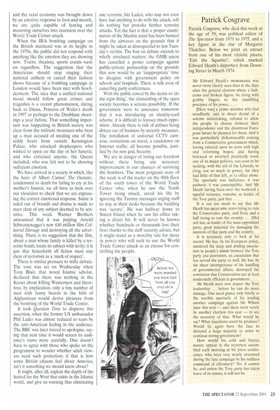Patrick Cosgrave
Patrick Cosgrave, who died this week at the age of 59, was political editor of The Spectator from 1971 to 1975, and a key figure in the rise of Margaret Thatcher. Below we print an extract from one of his most vitriolic pieces, 'Exit the Squatter', which marked Edward Heath's departure from Downing Street in March 1974.
Mr Edward Heath's monomania was never more clearly seen than in the days after the general election when, a ludicrous and broken figure, he clung with grubby fingers to the crumbling precipice of his power.. .
[Here was] a prime minister who had steadfastly, and in direct denial of a solemn undertaking, refused to allow the people to choose between their independence and the disastrous European future he planned for them. And it was particularly dishonourable coming from a Conservative government which, having entered upon its term with high and reforming hopes, and having betrayed or reversed practically every one of its major policies, was seen to be seeking, with the aid of the Liberals, to cling, not so much to power, for they had little of that left, as to office alone. The spectacle was ludicrous; it was pathetic: it was contemptible. And Mr Heath having been over the weekend a squalid nuisance, remains, as leader of the Tory party, just that..
It is not too much to say that Mr Heath has spent nine years trying to ruin the Conservative party, and three and a half trying to ruin the country.... [He] still has, as leader of the main opposition party, great potential for damaging the interests of that party and the country.
It is necessary only to look at his record. He has, by his European policy, sundered the deep and abiding association in people's minds between the Tory party and patriotism, an association that has served the party so well. He has, by the sheer incompetence of his handling of governmental affairs, destroyed the conviction that Conservatives are at least moderately efficient in government. . . .
Mr Heath must now depart the Tory leadership . . . before he can do more damage. One need glance only briefly at the terrible spectacle of his leading another campaign against Mr Wilson later this year — and there most surely be another election this year — to see the necessity of that. What would he say? What manifesto could he produce? Would he again have the face to demand a large majority in order to continue strong government?
How would his cold and barren nature appear to the reporters assembled each morning at his press conferences, who were very nearly overawed during the late campaign by his ruthless command of effrontery? No; it cannot be, and unless the Tory party has taken leave of its senses, it will not be.










































































 Previous page
Previous page